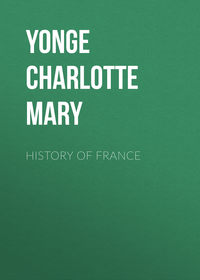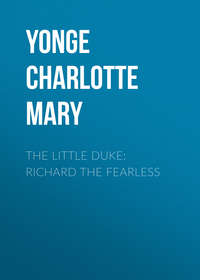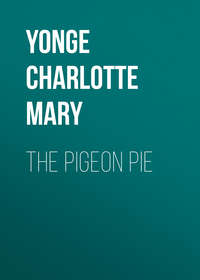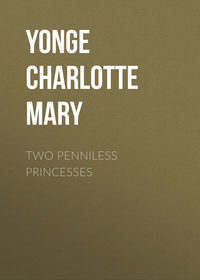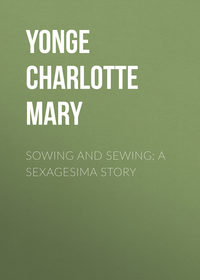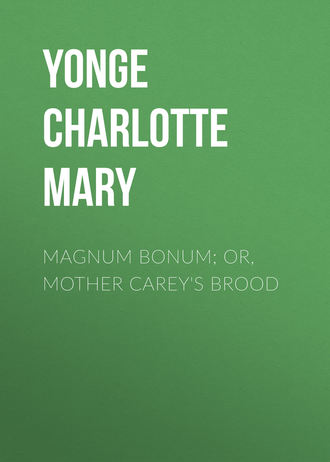 полная версия
полная версияПолная версия
Magnum Bonum; Or, Mother Carey's Brood
They saw no more of this mysterious little being, and the family soon returned from Church. The father was a fine, old-fashioned yeoman, the son had the style of a modern farmer, and the wife was so quiet, sensible, and matronly as to be almost ladylike. Her two little girls were dressed as well as Essie and Ellie, but all were essentially commonplace. They were very kind and friendly, anxious that Allen should stay as long as was good for him, as well as pressing in their hospitality to the two ladies. Mr. Gould was very anxious to drive them home in his gig, though he allowed that the road was very rough unless you went through Belforest Park, and that he never did.
This was surprising, for Belforest had always seemed as free as the turnpike-road, and River Hollow was apparently part of the estate, but there was an air of discouraging questions, so Carey suspected quarrels and asked none.
She was enlightened the next day when Colonel Brownlow brought his phaeton to fetch Allen home over the smooth park road. He told her that the Goulds were freeholders who had owned River Hollow from time immemorial, though each successive lord of Belforest tried to buy them out. The alienation between them and Mr. Barnes, the present master, had however much stronger grounds than these. His nephew and intended heir has stolen a match with the old man’s pretty daughter, and this had never been forgiven. The young couple had gone out to the West Indian isles, where the early home of her husband had been, and where he held some government office, and there fell a victim to the climate. Old Mr. Gould had gone home to fetch his daughter and her child, but the former had died before he reached her, and he had only brought back the little girl about two years ago.
Mr. Barnes ignored her entirely, and the Goulds, who had a good deal of pride, did not choose to apply to him. It was very unfortunate, for unless he had any other relations the child must be heiress to his immense wealth, though it was as likely as not that he would leave it all to hospitals out of pure vindictiveness.
They found Allen out of doors attended by the three little girls, all eagerly watching the removal of a sheep-fold. He was a pleasant-mannered boy, ready to adapt himself to all circumstances and to throw ready intelligent interest into everything, and he had won the hearts of the whole River Hollow establishment, from old Mr. Gould down to the smallest puppy.
Elfie, as he called her, stood her ground, and as she looked up under her brown mushroom hat Caroline was struck with her beauty, fair, but with a southern richness of bloom and glow—the carnation cheek of a depth of tint more often found in brunette complexions. The eyes were not merely blue by courtesy, but of a wonderful deep azure, shaded by very long lashes, dark except when the sun glinted them with gold, and round her shoulders hung masses of hair of that exquisite light auburn which cannot be accused of being red.
She let herself be greeted by the strangers with much more ease and grace than the other two children, but the slow walk of her grandfather and Colonel Brownlow seemed more than she could brook, and she went off, flying and spinning round like a little dog.
While all the acknowledgments and farewells were being made, and Colonel Brownlow was taking directions for finding Higg’s house and forge so as to remunerate him for his services, Elfie came hurrying up to Allen, holding out a great, gorgeous pink-lined shell, and laid within it two heads of scarlet geranium on a green leaf.
“O Elfie, Elfie! how could you?” exclaimed he, knowing them to be the only flowers in bloom.
“You must have them. There’s nothing else pretty to give you, and I love you,” said the child, holding up her face to kiss him.
“Elvira!” said her aunt in warning, “how can you! What will this lady think of you?”
Elvira’s gesture would in any other child have seemed a sulky thrust of the elbow, but in her it was more like the flutter of the wing of a brilliant bird.
“You must,” she repeated; and when he hesitated with “If Mrs. Gould,” she broke away, dashed the flowers, shell and all, into the middle of a clump of rosemary, and rushed out of sight like a little fury.
“You will excuse her, Mrs. Brownlow,” said Mrs. Gould, much annoyed. “She has been sadly spoilt, living among negro servants and having her own way, so that she is sometimes quite ungovernable.”
“Nay, nay, she is a warm-hearted little thing if you don’t cross her,” said the old farmer; “and the young gentleman has been very kind to her.”
Mrs. Gould looked as if she thought she knew her niece better than grandpapa did, but she was too wise to speak; and the little girls, having assisted Allen in the recovery of the shell and the flowers, he tendered them again to her.
“You had better keep them, Mr. Brownlow,” she said. “The shell is her own, and if you did not take it she is so tenacious that she would be sure to smash it to atoms.”
Allen accepted perforce and proceeded with his farewells, but as he was stooping down to kiss little five-year-old Kate Gould, something wet, cold, and sloppy came with great force on them both, almost knocking them down and bespattering them both with black drops. The missile proved to be a dripping sod pulled up from the duck-pond in the next field, and a glimpse might be caught of Elvira’s scarlet legs disappearing over the low wall between.
Over poor Mrs. Gould’s apologies a veil had best be drawn. Mother Carey pitied her heartily, but it was impossible not to make fun at home over the black tokens on Allen’s shirt-collar. His brothers and sisters laughed excessively, and Janet twitted him with his Undine, till he, contrary to his wont, grew so cross as to make his mother recollect that he was still a suffering patient, and insist on his lying quiet on the sofa, while she banished every one, and read Tennyson to him. Poetry, read aloud by her, was Allen’s greatest delight, but not often enjoyed, as Bobus and Jock scouted it, and Janet was getting too strong-minded and used to break in with inopportune, criticisms.
So to have Mother Carey to read “Elaine” undisturbed was as great an indulgence as Allen could well have, but she had not gone far before he broke out—
“Mother, please, I wish you could do something for that girl. She really is a lady.”
“So it appears,” said Carey, much disposed to laugh.
“Now, mother, don’t be tiresome. You have more sense than Janet. Her father was Vice-consul at Sant Ildefonso, one of the Antilles.”
“But, my dear, I am afraid that is not quite so grand as it sounds—”
“Hush, mother. He was nephew to Mr. Barnes, and they lived out of the town in a perfect paradise of a place, looking out into the bay. Mr. Gould says he can hardly believe he ever saw anything so gorgeously beautiful, and there this poor little Elvira de Menella lived like a princess with a court of black slaves. Just fancy what it must be to her to come to that farm, an orphan too, with an aunt who can’t understand a creature like that.”
“Poor child.”
“Then she can’t get any education. Old Gould is a sensible man, who says any school he could afford would only turn her out a sham, and he means, when Mary and Kate are a little older, to get some sort of governess for the three. But, mother, couldn’t you just let him bring her in on market days and teach her a little?”
“My dear boy, what would your aunt do? We can’t have sods of mud flying about the house.”
“Now, mother, you know better! You could make anything of her, you know you could! And what a model she would make! Think what a poor little desolate thing she is. You always have a fellow feeling for orphans, and we do owe those people a great deal of gratitude.”
“Allen, you special pleader, it really will not do! If I had not undertaken Essie and Ellie, I might think about it, but I promised your aunt not to have any other pupils.”
Allen bothered Essie and Ellie, but was forced to acquiesce, which was fortunate, for when on the last day of the holidays it was found that he had walked to River Hollow to take leave of the Goulds, his aunt administered to his mother a serious warning on the dangers of allowing him to become intimate there.
Caroline tingled all over during the discourse, and at last jumped up, exclaiming—
“My dear Ellen, half the harm in the world is done by making a fuss. Things don’t die half so hard when they die a natural death.”
Ellen knew Carey thought she had said something very clever, but was all the more unconvinced.
CHAPTER XII. – KING MIDAS
When I did him at this advantage take, An ass’s nowl I fixed upon his head. Midsummer Night’s Dream.In the early spring an unlooked-for obstacle arose to all wanderings in the Belforest woods. The owner returned and closed the gates. From time that seemed immemorial, the inhabitants of Kenminster had disported themselves there as if the grounds had been kept up for their sole behoof, and their indignation at the monopoly knew no bounds.
Nobody saw Mr. Barnes save his doctor, whose carriage was the only one admitted within the lodge gates, intending visitors being there informed that Mr. Barnes was too unwell to be disturbed.
Mrs. “Folly” Brownlow’s aberrations lost their interest in the Coffinkey world beside the mystery of Belforest. Opinions varied as to his being a miser, or a lunatic, a prey to conscience, disease, or deformity; and reports were so diverse, that at the “Folly” a journal was kept of them, with their dates, as a matter of curiosity—their authorities marked:—
March 4th.—Mr. Barnes eats nothing but fresh turtle. Brings them down in tubs alive and flapping. Mrs. Coffinkey’s Jane heard them cooing at the station. Gives his cook three hundred pounds per annum.
5th.—Mr. Barnes so miserly, that he turned away the housemaid for burning candles eight to the pound. (H. S. H.)
6th.—Mr. B. keeps a bloodhound trained to hunt Indians, and has six pounds of prime beef steaks for it every day. (Emma.)
8th.—Mr. B.‘s library is decorated with a string of human ears, the clippings of his slaves in “the Indies.” (Nurse.)
12th.—Mr. B. whipped a little black boy to death, and is so haunted by remorse, that he can’t sleep without wax-candles burning all round him. (Mrs. Coffinkey’s sister-in-law.)
14th.—Mr. Barnes’s income is five hundred thousand pounds, and he does not live at the rate of two hundred pounds. (Col. Brownlow.)
l5th.—He has turned off all his gardeners, and the place will be desolation. (H. S. H.)
16th.—He did turn off one gardener’s boy for staring at him when he was being wheeled about in his bath-chair. (Alfred Richards.)
17th.—He threw a stone, which cut the boy’s head open, and he lies at the hospital in a dangerous state. (Emma.)
18th.—Mr. Barnes was crossed in love when he was a young man by one Miss Anne Thorpe, and has never been the same man since, but has hated all society. (Query: Is this a version of being a misanthrope?)
19th.—He is a most unhappy man, who has sacrificed all family affections and all humanity to gold, and whose conscience will not let him rest. He is worn to a shadow, and is at war with mankind. In fine, he is a lesson to weak human nature. (Mrs. Rigby.)
22nd.—All his toilet apparatus is of “virgin gold;” he lets nothing else touch him. (Jessie.)
“Exactly like King Midas.” (Babie.)
The exclusion from the grounds was a serious grievance, entailing much loss of time and hindrance to the many who had profited by the private roads. The Sunday promenade was a great deprivation; nurses and children were cut off from grass and shade, and Mother Carey and her brood from all the delights of the enchanted ground.
She could bear the loss better than in that first wild restlessness, which only free nature could allay. She had made her occupations, and knew of other haunts, though many a longing eye was cast at the sweet green wilderness, and many regrets spent on the rambles, the sketches, the plants, and the creatures that had seemed the certain entertainment of the summer.
To one class of the population the prohibition only gave greater zest—namely, the boys. Should there be birds’ nests in Belforest unscathed by the youth of St. Kenelm’s? What were notice-boards, palings, or walls to boys with arms and legs ready to defy even the celebrated man-traps of Ellangowan, “which, if a man goes in, they will break a horse’s leg?” The terrific bloodhound alarmed a few till his existence was denied by Alfred Richards, the agent’s son; and dodging the keepers was a new and exciting sport. At first, these men were not solicitous for captures, but their negligence was so often detected, that they began to believe that their master kept telescopes that could penetrate through trees, and their vigilance increased.
Bobus, in quest of green hellebore, got off with a warning; but a week later, Robin and Jock were inspecting the heronry, when they caught sight of a keeper, and dashed off to find themselves running into the jaws of another. Swift as lightning, Jock sprung up into an ivied ash; but the less ready Bob was caught by the leg as he mounted, and pulled down again, while his captor shouted, “If there’s any more of you young varmint up yonder, you’d best come down before I fires up into the hoivy.”
He made a click and pointed his gun, and Robin shrieked, “Oh, don’t! We are Colonel Brownlow’s sons; at least, I mean nephews. Don’t! I say. Skipjack, come down.”
“You ass!” muttered Jack, as he crackled down, and was collared by the keeper. “Hollo! what’s that for?”
“Now, young gents, why will you come larking here to get a poor chap out of his situation. It’s as much as my place is worth not to summons you, and yet I don’t half like to do it to young gents like you.”
“What could they do to us?” asked Jock.
“Well, sir, may be they’d keep you in the lock-up all night; and what would your papa and mamma say to that?”
“My father is Colonel Brownlow,” growled Robin.
“More shame for you, sir, to want to get a poor man out of his place.”
“Look here, my man,” said Jock with London sharpness and impudence, “if you want to bully us into tipping you, it’s no go. We’ve only got one copper between us, and nothing else but our knives; and if we had, we wouldn’t do such a sneaking thing!”
“I never meant no such thing, sir,” said the keeper; “only in case Mr. Barnes should hear of our good nature.”
“Come along, Robin,” said Jock; “if we are had up, we’ll let ‘em know how Leggings wanted us to buy off!”
Wherewith Jock made a rush, Rob plunged after him into the brambles, and they never halted till they had tumbled over the park wall, and lay in a breathless heap on the other side. The adventure was the fruitful cause of mirth at the Folly, but not a word was breathed of it at Kencroft.
A few other lads did actually pay toll to the keepers, and some penniless ones were brought before the magistrates and fined for trespass, “because they could not afford it,” as Caroline said, and to the Colonel’s great disgust she sent two sovereigns by Allen to pay their fines and set them free.
“It was my own money,” she said, in self-defence, “earned by my models of fungi.”
The Colonel thought it an unsatisfactory justification, and told her that she would lay up trouble for herself by thus encouraging insubordination. He little thought that the laugh in her eyes was at his complacent ignorance of his own son’s narrow escape.
Allen was at home for Easter, when Eton gave longer holidays than did St. Kenelm, so that his brothers were at work again long before he was. One afternoon, which had ended in a soaking mist, the two pairs of Roberts and Johns encountered him at the Folly gate so disguised in mud that they hardly recognised the dainty Etonian.
“That brute Barnes,” he ejaculated; “I had to come miles round through a disgusting lane. I wish I had gone on. I’d have proved the right of way if he chose to prosecute me!”
“Father says that’s no go,” said Robin.
“I say, Allen, what a guy you are,” added Johnny.
“And he’s got his swell trousers on,” cried Jock, capering with glee.
“I see,” gravely observed Bobus, “he had got himself up regardless of expense for his Undine, and she has treated him to another dose of her native element.
“She had nothing to do with it,” asseverated Allen, “she was as good as gold—”
“Ah! I knew he wasn’t figged out for nothing,” put in Jock.
“Don’t be ashamed, Ali, my boy,” added Bobus. “We all understand her little tokens.”
“Stop that!” cried Allen, catching hold of Jock’s ear so as to end his war-dance in a howl, bringing the ponderous Rob to the rescue, and there was a general melee, ending by all the five rolling promiscuously on the gravel drive. They scrambled up with recovered tempers, and at the sight of an indignant housemaid rushed in a general stampede to the two large attics opening into one another, which served as the lair of the Folly lads. There, while struggling, with Jock’s assistance, to pull off his boots, Allen explained how he had been waylaid “by a beast in velveteens,” and walked off to the nearest gate.
“Will he summons you, Ali? We’ll all go and see the Grand Turk in the dock,” cried Jock.
“Don’t flatter yourself; he wouldn’t think of it.”
“How much did you fork out?” asked Bobus.
Allen declaimed in the last refinement of Eton slang (carefully treasured up by the others for reproduction) against the spite of the keeper, who he declared had grinned with malice as he turned him out at a little back gate into a lane with a high stone wall on each side, and two ruts running like torrents with water, leading in the opposite direction to Kenminster, and ending in a bottom where he was up to the ankles in red clay.
“The Eton boots, oh my!” cried Jock, falling backwards with one of them, which he had just pulled off.
“And then,” added Allen, “as I tried to get along under the wall by the bank, what should a miserable stone do, but turn round with me and send me squash into the mud and mire, floundering like a hippopotamus. I should like to get damages from that villain! I should!”
Allen was much more angry than was usual with him, and the others, though laughing at his Etonian airs, fully sympathised with his wrath.
“He ought to be served out.”
“We will serve him out!”
“How?”
“Get all our fellows and make a jolly good row under his windows,” said Robin.
“Decidedly low,” said Allen.
“And impracticable besides,” said Bobus. “They’d kick you out before you could say Jack Robinson.”
“There was an old book of father’s,” suggested Jock, “with an old scamp who starved and licked his apprentices, till one of them dressed himself up in a bullock’s hide, horns and hoofs, and tail and all, and stood over his bed at night and shouted—
“‘Old man, old man, for thy cruelty, Body and soul thou art given to me; Let me but hear those apprentices’ cries, And I’ll toss thee, and gore thee, and bore out thine eyes.’And he was quite mild to the apprentices ever after.”
Jock acted and roared with such effect as to be encored, but Rob objected. “He ain’t got any apprentices.”
“It might be altered,” said Allen.
“Old man, old man, thy gates thou must ope,”Bobus chimed in.
“Nor force Eton swells in quagmire to grope.”“Bother you, don’t humbug and put me out.
“Old man, old man, if for aught thou wouldst hope, Thy heart, purse, and gates thou must instantly ope. Let me but—”“Get Mother Carey to write it,” suggested his cousin John.
“No; she must know nothing about it,” said Bobus.
“She’d think it a jolly lark,” said Jock.
“When it’s over,” said Allen. “But it’s one of the things that the old ones are sure to stick at beforehand, if they are ever so rational and jolly.”
“‘Tis a horrid pity she is not a fellow,” sighed Johnny.
“And who’ll do the verses?” said Rob.
“Oh, any fool can do them,” returned Bobus. “The point is to bell the cat.”
“There’d be no getting in to act the midnight ghost,” said Allen.
“No,” said Jock; “but one could hide in the big rhododendron in the wolf-skin rug, and jump out on him in his chair.”
In Allen’s railway rug, Jock rehearsed the scene, and was imitated if not surpassed by both cousins; but Allen and Bobus declared that it could not be carried out in the daylight.
“I could do it still better,” said Jock, “if I blacked myself all over, not only my face, but all the rest, and put on nothing but my red flannel drawers and a turban. They’d take me for the ghost of the little nigger he flogged to death, and Allen could write something pathetic and stunning.”
“You might cut human ears out of rabbit-skins and hang them round your neck,” added Bobus.
“You’d be awfully cold,” said Allen.
“You could mix in a little iodine,” suggested Bobus. “That stings like fun, and a coppery tinge would be more natural.”
There was great acclamation, but the difficulty was that the only time for effecting an entrance into the garden was between four and five in the morning, and it would be needful to lurk there in this light costume till Mr. Barnes went out. No one would be at liberty from school but Allen, and he declined the oil and lamp-black even though warmed up with iodine.
“Could it not be done by deputy?” said Bobus; “we might blacken the little fat boy riding on a swan, the statue, I mean.”
“What, and gild the swan, to show how far his golden goose can carry him?” said Jock.
“Or,” said Allen, “there’s the statue they say is himself, though that’s all nonsense. We could make a pair of donkey’s ears in Mother Carey’s clay, and clap them on him, and gild the thing in his hand.”
“What would be the good of that?” asked Robert.
However, the fun was irresistible, and the only wonder was that the secret was kept for the whole day, while Allen moulded in the studio two things that might pass for ass’s ears, and secreted cement enough to fasten them on. The performance elicited such a rapture of applause that the door had to be fast locked against the incursion of the little ones to learn the cause of the mirth. When Mother Carey asked at tea what they were having so much fun about they only blushed, sniggled, and wriggled in their chairs in a way that would have alarmed a more suspicious mother, but only made her conclude that some delightful surprise was preparing, for which she must keep her curiosity in abeyance.
“Nor was she dismayed by the creaking of boots on the attic stairs before dawn, and when the boys appeared at breakfast with hellebore, blue periwinkle, and daffodils, clear indications of where they had been, she only exclaimed—
“Forbidden sweets! O you naughty boys!” when ecstatic laughter alone replied.
She heard no more till the afternoon, when the return from school was notified by shouts from Allen, and the boys rushed up to the verandah where he was reading.
“I say! here’s a go. He thinks Richards has done it, and has written to Ogilvie to have him expelled.”
“How do you know?”
“He told me himself.”
“But Ogilvie has too much sense to expel him!”
“Of course, but there’s worse, for old Barnes means to turn off his father. Nothing will persuade the old fellow that it wasn’t his work, for he says that it must be a grammar-school boy.”
“Does Dicky Bird guess?”
“Yes, but he’s all right, as close as wax. He says he was sure no one but ourselves could have done it, for nobody else could have thought of such things or made them either.”
“Then he has seen it?”
“Yes, and he was fit to kill himself with laughing, though his father and old Barnes were mad with rage and fury. His father believes him, but old Barnes believes neither of them, and swears his father shall go.”
“We shall have to split on ourselves,” elegantly observed Johnny.
“We had better tell Mother Carey. Hullo! here she is, inside the window.”
“Didn’t you know that,” said Allen.
Therefore the boys, leaning and sprawling round her, half in and half out of the window, told the story, the triumph overcoming all compunction, as they described the morning raid, the successful scaling of the park-wall, the rush across the sward, the silence of the garden, the hoisting up of Allen to fasten on the ears, and the wonderful charms of the figure when it wore them and held a golden apple in its hand. “Right of Way,” and “Let us in,” had been written in black on all the pedestals.






